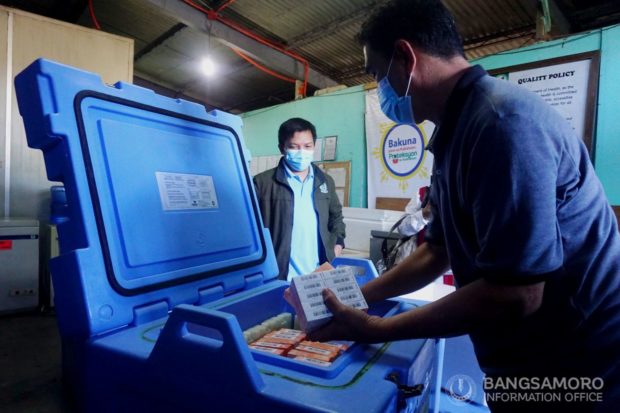Power supply, security issues hamper vaccine rollout in BARMM

COVID-19 vaccines stored inside cold storage boxes arrive at the Ministry of Health (MOH) compound in Cotabato City. Image from Bangsamoro Information Office website
MANILA, Philippines — The Bangsamoro Autonomous Region in Muslim Mindanao (BARMM) has the lowest COVID-19 vaccination coverage due to challenges in transportation and storage, the Department of Health (DOH) said Friday.
Health Undersecretary Myrna Cabotaje, however, assured that despite the low vaccination coverage in BARMM, the national government is not neglecting the region in the delivery of vaccines.
“In terms of pinakamababa (of lowest vaccination coverage), of course, BARMM, because the population is small, and we have challenges in delivering vaccines to the BARMM. But we want to assure everybody that we are also giving vaccines to BARMM,” Cabotaje told an online press briefing.
Cabotaje added that the lack of regular flights is also one of the challenges in transporting vaccines to the region.
“The other challenge, kapag naglagay ka sa Sulu and Tawi-Tawi, hindi po regular ‘yung flights,” she said.
(The other challenge is that if you allocate vaccines to Sulu and Tawi-Tawi, the flights are not regular.)
She also mentioned that Basilan, Sulu, Tawi-Tawi (Basulta) used to borrow cold storage facilities from their neighboring areas in the Zamboanga Peninsula However, she said that this practice may no longer be continued due to more vaccines coming in.
“Yung Basulta, Basilan, Sulu, Tawi-Tawi are adjacent to Zamboanga. Noong wala tayong many influx of vaccines, nakikigamit sila ng cold room sa ating Region 9 but now they cannot be accommodated kasi marami na ring bakuna ang dumarating,” she added.
(Areas in Basulta are next to Zamboanga. When they didn’t have a lot of vaccines, they used the cold storage in Region 9 but now they can no longer be accommodated because many vaccines are already coming in.)
Cabotaje also cited other factors, such as peace and security concerns and reoccurring brownouts, which also hindered them from delivering large amounts of vaccines in the region.
Despite these challenges, she assured the public that the DOH is collaborating with its partners, including the United Nations Children’s Emergency Fund, to develop strategies to ensure that these areas would still be able to receive vaccines.
As of July 8, around 12.7 million doses of COVID-19 vaccines have been administered in the country, with 9.4 million provided as first dose and 3.2 million as second dose. — Sofia Vertucio, trainee